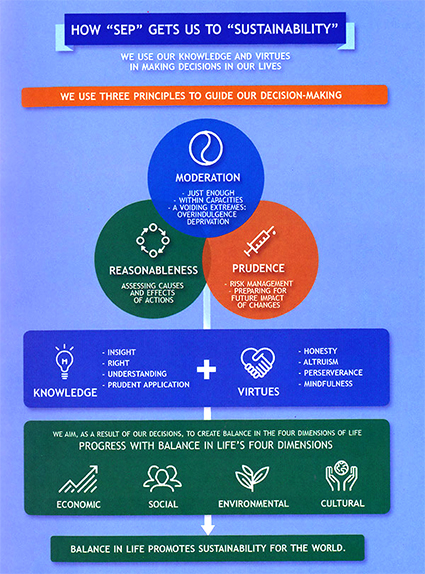Economy
Sufficiency Economy Philosophy: Thailand
- 17 Sep 2021
- 3 min read
Why in News
Thailand believes that its homegrown development approach of Sufficiency Economy Philosophy (SEP) can serve as an alternative approach to achieving the Sustainable Development Goals (SDGs).
- In 2020, Indian PM announced Atmanirbhar Bharat or Self-reliant India Movement, which has a similar approach to make India and its citizens independent and self-reliant in all senses. When India speaks of self-reliance, it does not advocate for a self-centered system, there is also a concern for the whole world’s happiness, cooperation and peace.
Key points
- About:
- It is an innovative approach to development designed for practical application over a wide range of problems and situations.
- It is also part of the fundamental administration policy of the state (Thailand).
- It was introduced in Thailand after the Asian financial crisis in 1997.
- It is a philosophy that guides one’s inner thinking to immunize oneself from external shocks and can be applied in any setting and at any levels.
- It is an innovative approach to development designed for practical application over a wide range of problems and situations.
- Levels:
- Individual and Family Level: It means living a simple life, living within one's means, and refraining from taking advantage of other people.
- Community Level: It involves joining together to participate in decision-making, developing mutually-beneficial knowledge, and appropriately applying technology.
- National Level: It postulates a holistic approach with an emphasis upon appropriateness, competitive advantage, low risk, and avoiding over-investment.
- It involves keeping abreast with what is happening elsewhere in the world, hedging investments, and reducing imports and over dependence on other countries.
- Pillars:
- Knowledge: It enables effective planning and execution of developmental activities.
- Ethics and Values: It enhances human development by emphasizing honesty, altruism, and perseverance, with creating active, engaged citizens, and promoting good governance as the ultimate goal.
- Principles:
- Moderation: It entails producing and consuming within one’s capacity and avoiding overindulgence.
- Reasonableness: It is using one’s mental faculties to examine the causes and consequences of actions on one’s well-being, household and community.
- Prudence: It refers to risk management in order to be prepared for impacts from any disruptions.





